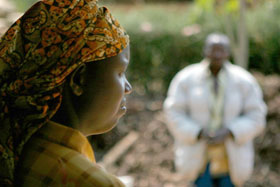Cecile Mukambabazi aged 46, was born in Gisagara District in Northern Province. She is a mother of three and widow of the 1994 Genocide against the Tutsi that took her husband’s life.“As the war started, I remember it was a Thursday and on Friday amidst gunfire and persecution, I gave birth to a baby. I, my newborn baby and my two other children went through the hardest times of life but still managed to live,” says Mukambabazi.


Cecile Mukambabazi aged 46, was born in Gisagara District in Northern Province. She is a mother of three and widow of the 1994 Genocide against the Tutsi that took her husband’s life.
"As the war started, I remember it was a Thursday and on Friday amidst gunfire and persecution, I gave birth to a baby. I, my newborn baby and my two other children went through the hardest times of life but still managed to live,” says Mukambabazi.
She had no place to call home as the violence escalated and she witnessed people being killed including her beloved husband. After the war she had to pick up her pieces of life to continue a life without a husband and father to her children.After the Genocide, Mukambabazi says she felt insecure.
"I started feeling sick. I had no desire to eat or do anything at all,” she says.
"When I realized I was living alone without my husband, I thought of committing suicide but then I couldn’t because I had three children looking up to me,” says Mukambabazi.
Life after Genocide as a survivor was quite different, she attempted to nurse her inner wounds with daydreams of revenge but in the end it only made her feel worse until she realized that she needed healing from her painful past memories.
"When wronged and you hold on to unforgiveness, it engulfs fear and insecurity inside you, something I experienced after the Genocide,” she said.
Letting go of unforgiveness
Mukambabazi believes that when people who have gone through hard times refuse to forgive they relinquish their power to that person or incident that hurts them. In the end, it is not the person that was hurt that suffers most but their hearts.
"Letting go of our resentment frees us from placing blame on them and allows us to look toward ourselves for peace,” Mukambabazi says adding that, "it’s a new principle” she learnt after going through counselling.
"I felt deflated after the war and lost all hope and the love to live, with no one to lean on. There was no one to confide in, not even God,” she says.
The day her husband was killed, overnight, her friends and neighbours became her enemy and wanted to kill her and the children but today she has no problem reconciling with the same people who hunted her down to no avail. She chose to move past the pain caused by the profound experience she went through during the 1994 Genocide against the Tutsi.
She emphasised that Rwandans can’t receive reconciliation without forgiveness.
Mukambabazi used to think that Gacaca would not be very useful because it doesn’t bring back the dead but today she confesses that Gacaca Courts have helped people face the truth of what befell the Tutsi in the 1994 Genocide.
Healing from Trauma
She was traumatised but did not realise it until Alert International, through its project involved in fostering social and economic reintegration and reconciliation incorporated her in its social life activities.
"That is when I learnt that I was suffering from trauma after a few counselling sessions,” she said.
After getting positive therapy on unity and reconciliation participants get involved in debates which play a fundamental role in stopping them from dwelling more on past memories. Today Mukambabazi can sleep comfortably which was impossible before she started counselling.
She was trained in income generating projects and received loans worth Rwf50,000 through Duterimbere Microfinance.
"I invested the money in a local brew locally called ‘Ikigage’ as well as in the business of selling pork and today I own a mobile phone and can take care of my children,” she said.
The gospel of forgiveness has helped her live a changed life.
"I am in position to pay family expenses without burdening local authorities for support,” she adds. Mukambabazi says she has healed beyond trauma and today she is living an exemplary life in the area because she has been released from troubling traumatic situations.
"I believe that unity and reconciliation is achievable among the Rwandan society.”
Mukambabazi said she has a strong conviction that she is going to have a great future but the only great challenge as a Genocide survivor who lost almost every thing is getting a better house and to live in harmony with everyone in her community.
"Today we share secrets; hard times and together we look forward to live a prosperous life in our motherland Rwanda,” says Mukambabazi.


